This is the second year in a row that Lancaster's students, teachers and parents have celebrated the start of Bullying Prevention Month in their city.
Dozens turned out to watch their mayor and city council sign a Not in Our Town proclamation declaring Lancaster's schools a safe zone from intolerance and hate.
Check out the full story in The Antelope Valley Times.
Just like last year, Mayor R. Rex Harris joined with local school district administrators to officially sign the proclamation that challenges local leaders and students to stand up to bullying in their schools.
Here's the full proclamation:
WHEREAS schools make substantial contributions to the future of America and to the development of our young people as responsible and productive citizens; and
California

Not In Our School began Bullying Prevention Month with the powerful PSA, “Break Bullying” to stress the serious impact of bullying. We end the month with a focus on SOLUTIONS!
Krista King is the co-adviser with Kurt Dearie of Carlsbad High School's Gay Straight Alliance (GSA) in Carlsbad, CA. Last February, King and Dearie went to the Center for Excellence in School Counseling and Leadership conference and were inspired by the Not in Our School presentation. In the session, they watched and discussed the video titled, "What Do You Say to That's So Gay?"
Back at Carlsbad High, King teaches Graphic Design and Photography. One of the Visual Arts California Content Standards for California high school students is to design a campaign. She put a lot of thought into how to approach this project, asking around to others for their ideas. From there, they began brainstorming. They wanted to create a campaign that the whole school would want to take part in.
King loved the idea of making posters. She played the "What Do You Say to That's So Gay?" video in her classes and they discussed the way a campaign around this topic could impact their school in a positive way.
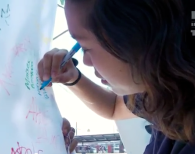
Hispanic Heritage Month, which runs until Oct. 15, is an opportunity to reflect on the contributions of new Americans. In this short video, high school students in Los Angeles embark on a project to help change the perception of new immigrants in their community.
In their campaign “Don’t drop the I-bomb” they hope to remove the negative connotation of the word “illegal” and create a more equal and welcoming atmosphere for everyone.
Discuss:
What particular actions of the students do you believe were the most effective?
Do you think the actions of these students will create a more positive view of immigrants in their community? Why or why not?
What are other ways people can work together to create a more positive atmosphere for recent immigrants?
This video features Facing History and Ourselves teachers at Animo Jackie Robinson High School.
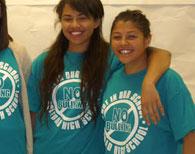
Soledad High School students come together to pledge against bullying. Photo Courtesy of Monterey County Office of Education.Soledad High School Assistant Principal Laura Eras and Intervention Specialist Myra Chavez called us from Soledad, CA, a small farming community located 25 miles southeast of Salinas. Using Not In Our School materials, they launched a weeklong anti-bullying campaign.

Palo Alto High interviews younger brother Noah Hornikat It Gets Indie last year. Photo Courtesy of Julian Hornik.
When Julian Hornik was cyber-bullied for being gay, he didn’t have to worry about having anything but the full support from his family.
In middle school, the young musician found derogatory comments on YouTube videos of his performances. Classmates created a Facebook page that targeted him for being gay. With the support of his family, he said it wasn’t hard for him to “push it away.”
Julian and his younger brother Noah are part of an extended family of people who support LGBT rights. While Noah has not personally experienced bullying, he believes the internet allows people to feel “safer and more confident” when they bully and harass others.
“They don’t have to see the impact,” Noah said. “People will go a lot farther.”
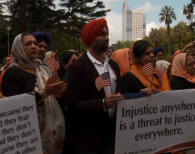
Our hearts and thoughts are with the community of Oak Creek, Wisconsin today, after yesterday's tragic shooting at a Sikh temple that claimed seven lives—including the gunman—and left three wounded.
The Sikh community has been a target of hate since the Sept. 11, 2001 terrorist attacks and often mistaken for Muslim. Yesterday's tragedy reminds us of the two Sikh grandfathers who were shot during their daily stroll in Elk Grove, Calif. in March 2011. We joined the community seven days after the shootings and documented their interfaith vigil, and again, for the community's Sikh Solidarity Day, detailed below.
This piece is an example of community solidarity with the Sikh community and law enforcement leadership.
One of the community leaders in Elk Grove was Amar Shergill, a West Sacramento attorney who is a board member of that city's Sikh temple and the American Sikh Political Action Committee. He spoke about Oak Creek, Wisconisin's tragedy with the local Patch.
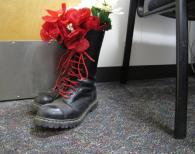
This is the second in a five-part series published by our public media partneras at Fronteras. Listen to the accompanying radio piece.
By Adrian Florido
SAN DIEGO — Detective Ellen Vest investigates hate crimes for the San Diego County Sheriff’s Department, and she recently recalled a case in which a white skinhead attacked an African-American man outside a bar, causing brain damage.
Vest thought the assault was a hate crime.
“He had one swastika on his shoulder that he displayed to our African-American victim. So we served a search warrant on his house,” she said of the suspect, who was ultimately convicted. “He had a money clip that had a little KKK man on it, with a burning cross. He didn’t have a lot, but what he did have was really pretty specific to show he was a biased individual.”
To convict a suspect of a hate crime, proving that bias is critical. And for detectives like Vest, one of the best ways to do that is by looking for those hate symbols.
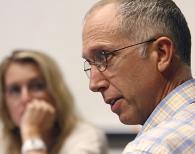
Human Relations Commission Vice-Chair Craig Blomberg speaks at the June 28 HRC meeting. Photo: Fred Gladdis/Davis Enterprise
The college town of Davis, Calif. won't let three recent hate incidents divide them. Instead, they are using the opportunity to unite.
The community is directing its energy creatively, literally coming together to produce a video collage titled "Speak Out for Tolerance" in response to the recent city hate incidents.
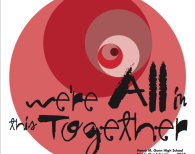
In a few hours, the end-of-day bell will ring at Gunn High School and students will gather in the school squad with a scream. After a daylong vow of silence—representing the inability of many teens to express themselves fully because of sexual orientation or gender identity—this communal scream will symbolize the "Breaking of the Silence" that is felt by LGBTQ youth and allies.
The Day of Silence activity is just one of many during Gunn's Not In Our School Week. The Palo Alto, Calif. high school has hosted a Not In Our School for nearly a decade to "promote acceptance, awareness and identity safety."
"One of the reasons why I like NIOS Week is that it reminds staff and students that it’s OK to actively participate in what’s going on around you, and that you should be supported for standing up against something that isn’t right," said Kristy Blackburn, reflecting on how she uses Not In Our School activities in her English classroom.
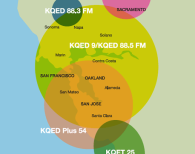
Watch the opening scenes to Class Actions by clicking on the image above.
"Bullying, racism, discrimination, hate. You know it's out there. It makes you cringe. But what are you gonna do about it?"
--MTV post on Not In Our Town: Class Actions
KQED will broadcast Not In Our Town: Class Actions on Monday, March 19 at 7:30 p.m. The broadcast is an opportunity to open the conversation about how to stop hate and bullying. Join us in getting a Bay Area discussion going in your schools and communities.
